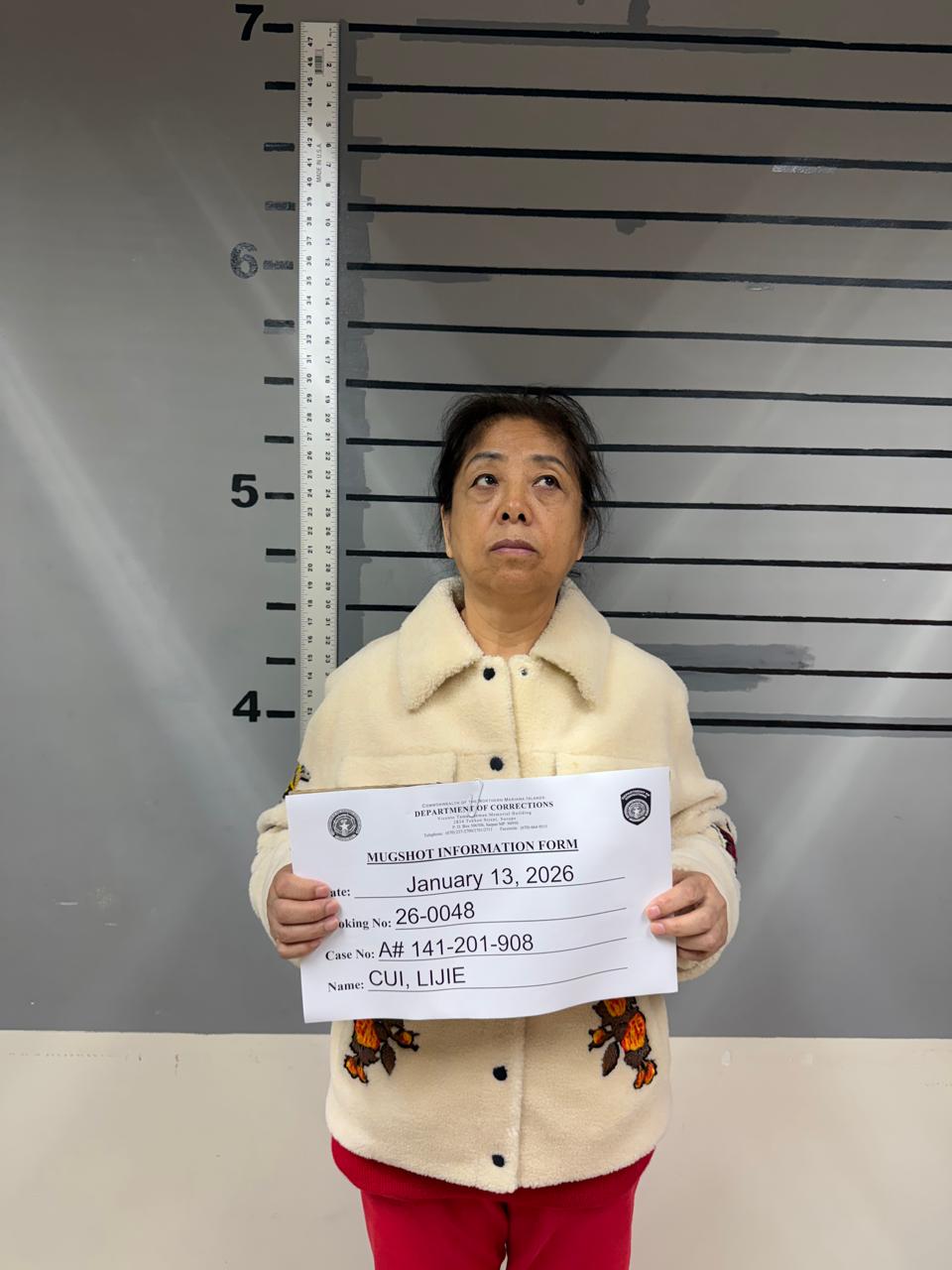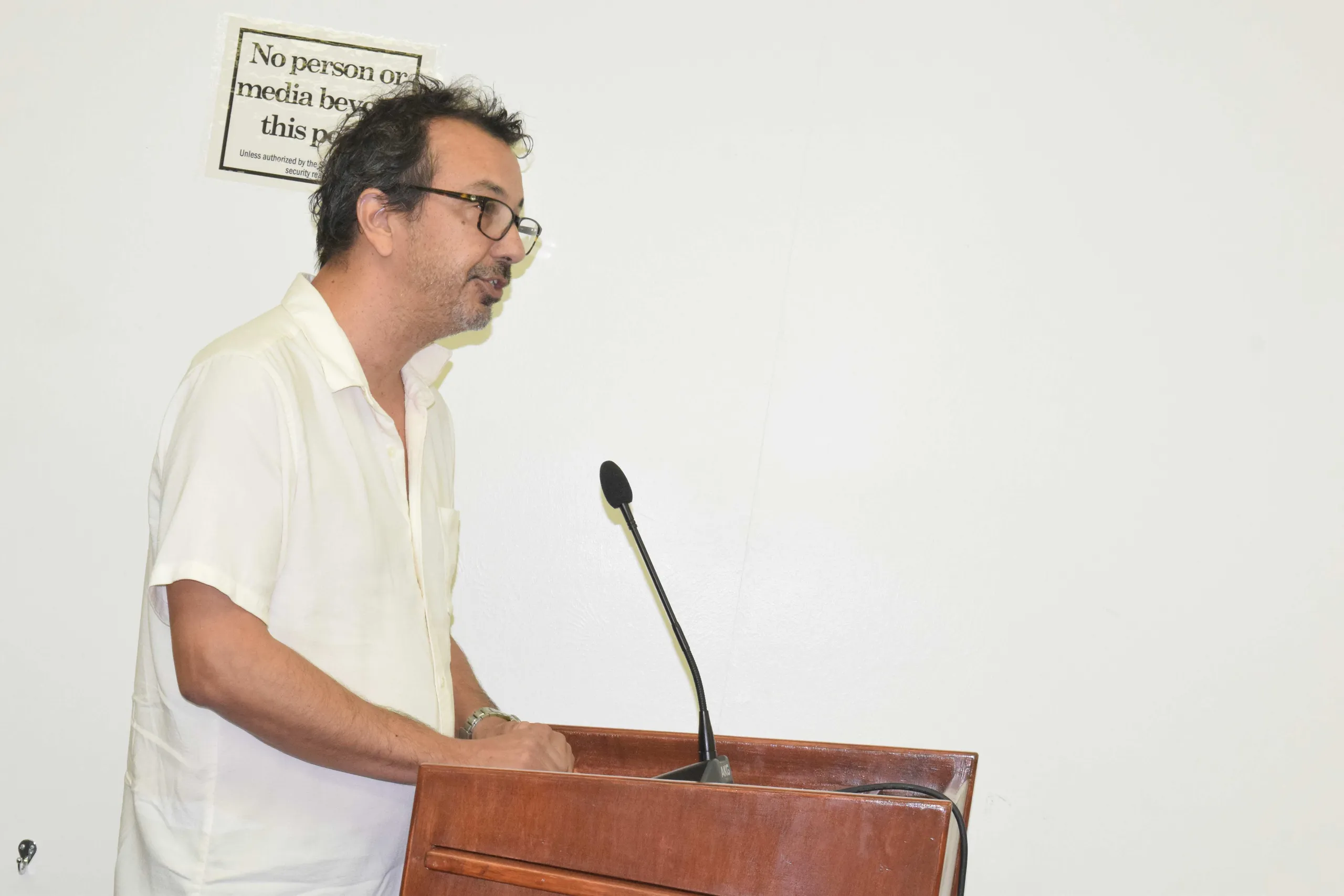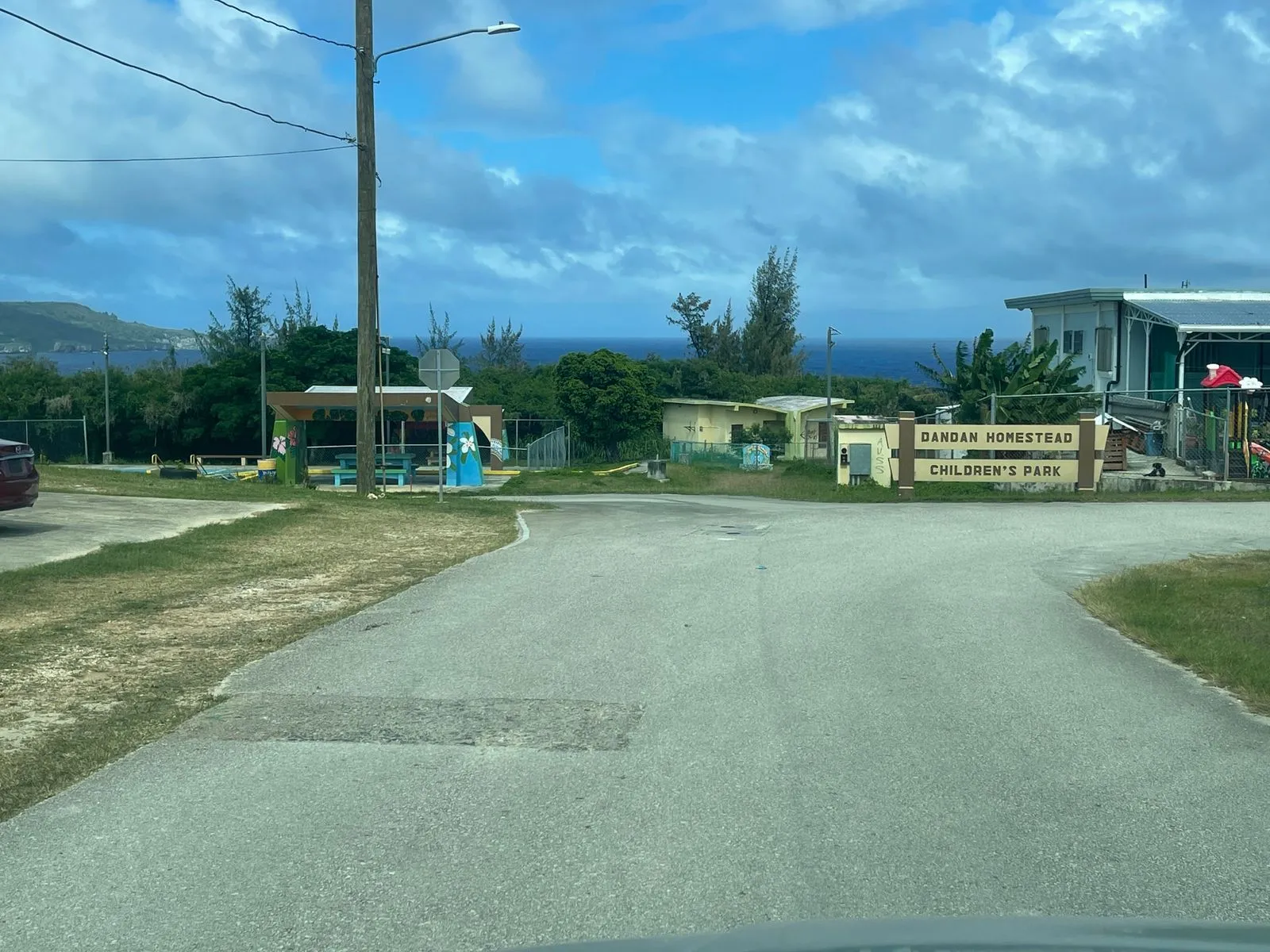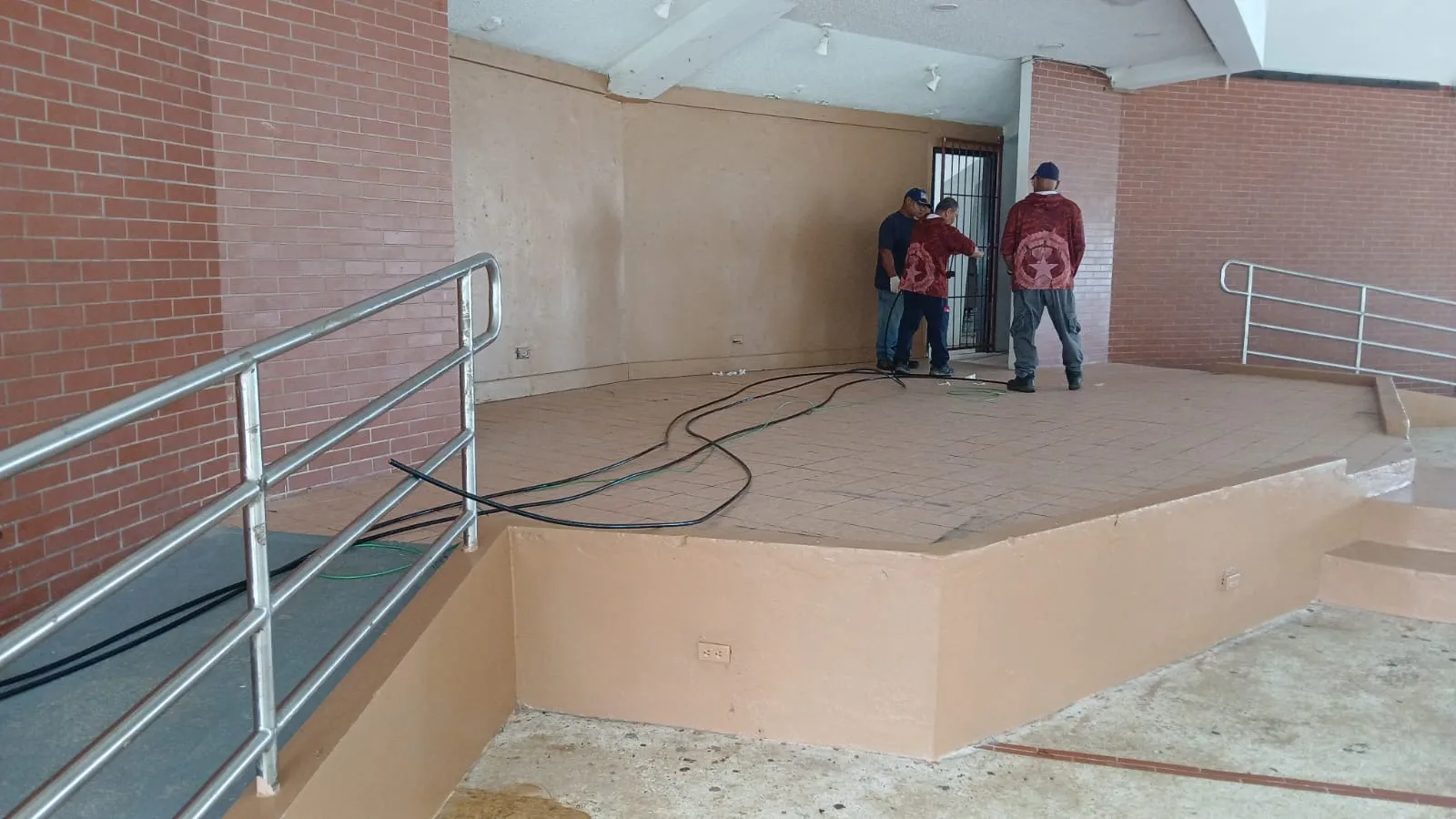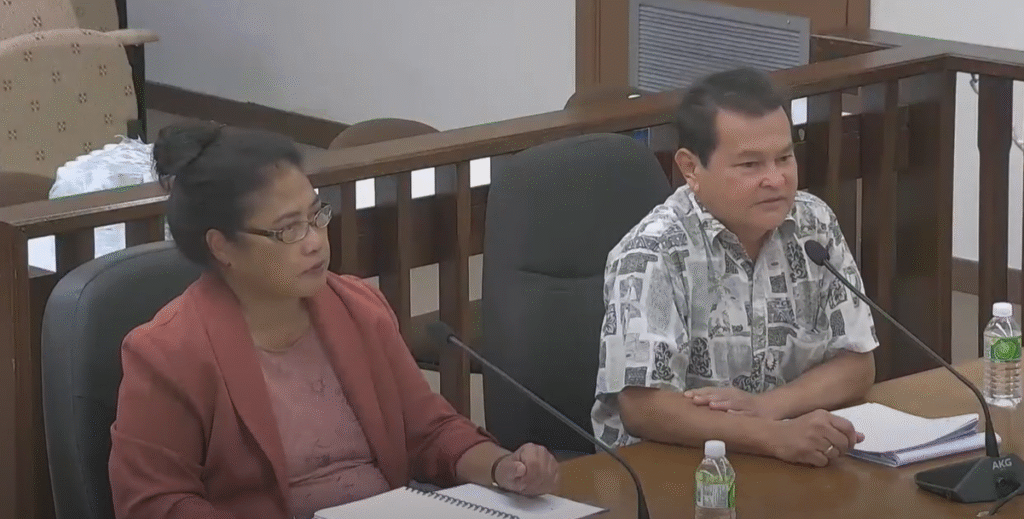
Zoning Board Chair Henry S. Hofschneider, right, and Zoning Administrator Therese T. Ogumoro appear before the Senate Committee on Resources, Economic Development and Workforce in the Senate chamber on Wednesday.
YouTube screenshot
ZONING Board Chair Henry S. Hofschneider on Wednesday expressed strong opposition to Senate Bill 24-23, which would suspend the implementation of the zoning rules for five years, calling it “a bad bill.”
During a meeting of the Senate Committee on Resources, Economic Development and Workforce in the Senate chamber at 9 a.m., Hofschneider and Zoning Administrator Therese T. Ogumoro were asked to comment on the bill.
Co-authored by Sens. Manny Gregory T. Castro and Corina Magofna, S.B. 24-23 also proposes dissolving the Zoning Board and transferring to the Department of Public Works all personnel, records, business and financial accounts, and funds used in the administration and operations of the Saipan Zoning Office.
According to the bill, which includes a sunset provision and would expire in five years, “the administration and implementation of the Saipan Zoning Law has been problematic, often stifling economic growth on Saipan.”
Ogumoro asked the senators to disapprove the bill.
Hofschneider said he would “at least try to be polite a little bit to the authors of the bill, [but] I know, what I say here offends you, [and] that’s fine. We are here to talk about the bill.”
He said that if the bill aims to “champion regression,” then the authors “are nailing it.” He said that suspending the law for five years puts off any zoning for five years. He wonders if the intention is to abolish the board and transfer the staff to DPW “to do what?”
Hofschneider said S.B. 24-23 is unclear. There is no guarantee DPW is ready to receive additional employees or if it has funding for them — or if the funding that the zoning office has now should be transferred to DPW.
The bill doesn’t address those issues, and neither does it include language to safeguard whatever the Zoning Board has built over the years, Hofschneider said.
“It is a bad bill. I don’t know where [the situation on Saipan] is going to go without zoning,” he said.
Hofschneider said the bill highlights several reasons for suspending the zoning law: lack of transparency and efficiency, its negative impact on the economy, delays in decision-making, and the zoning administration encroaching on the responsibilities of other agencies, particularly DPW.
“Those are the things that the authors put in the bill. But are they in fact verifiable?” Hofschneider asked.
He said that after S.B. 24-23 was pre-filed, the zoning administrator “pulled out a lot of files and looked at them, [including] the minutes of board meetings to see which decisions were delayed, to see where efficiency was lacking, where inconsistencies and enforcement of the law occurred.”
“We found none,” Hofschneider said. “So it’s a guessing game where the authors are coming from,” he added.
He said that “going back to a time without zoning rules would only add more burden on the people of Saipan. Do you want to see auto shops, bars, and cannabis retail shops in your village homesteads or neighborhoods?”
“Kill the zoning law, and those poker arcades are going to go back to the villages, near schools. You want that to happen?” Hofschneider asked the senators.
A starting point
Magofna said, S.B. 24-23 “is not set in stone,” and is “actually a great way to start the dialogue. It’s not perfect in any way. But it’s a starting point to sit down and have this conversation.”
She added, “I think it is important to let the people know also [that] the bill does not intend to put zoning out of commission. The bill is just intended to put a pause so that we can take a look at the existing regulations and see where we could improve and enhance them. In no way are we saying we have to stop zoning, because we need zoning.”
Castro also made it clear that the bill would not abolish the Zoning Board. The committee, he said, recognizes the value of having zoning rules. However, he said, there are inconsistencies in the law. “If we were to get a lawsuit because of those inconsistencies, who ends up footing the bill?”
“When we talk about land values to be retained, I see a lot of buildings being demolished and blighted properties. The question there is, right now, the cost of construction is expensive. You have a building that is just missing maybe a wall in the front, but we require the owner to demolish the building. What’s the appraisal value going to look like for the owner of the property?” Castro asked.
“We are talking about cost savings, and we have to ask ourselves, is the process helping us or hurting us? Can it be improved?”
He said that if they do not care about the zoning employees, they would have proposed abolishing the zoning law. “But we did not. The bill is just to suspend and reassess while we really look at programmatic issues,” he said.
At the end of the day, Castro said, “who is the Zoning Board really protecting? Our people or big businesses?”
He said there are a lot of people in the business community and residents themselves who talk about their frustration. In the villages, he said, there are a lot of small businesses expressing their concerns.
“Again, this is not to say we don’t appreciate the work of the Zoning Board — we are just trying to look at the process, assess it and improve it,” he said.
The committee agreed to table the bill for further review.
Also present during the committee meeting were Senate Floor Leader Donald M. Manglona, Sen. Ronnie Calvo, Senate Vice President Karl King-Nabors and Sen. Frank Q. Cruz.


